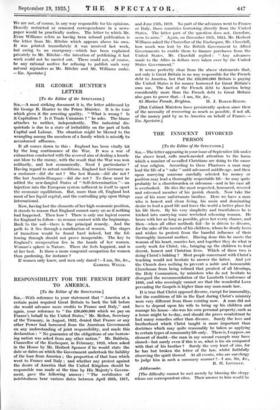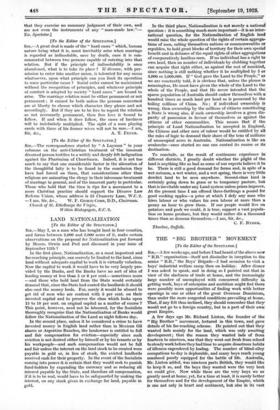THE INNOCENT DIVORCED PERSON
[To the Editor of the SPECTATOR.] SIR,—The letter appearing in your issue of September 5th under the above head, calls much-needed attention to the harm which a number of so-called Christians are doing to the cause of true religion. According to these Pharisees a man may lead the life of a " rake " until advanced middle-age, and then upon marrying someone carefully selected for money or position may lead a thoroughly respectable life—he may quite probably be a churchwarden or sidesman—and in his case all is overlooked. He dies the most respected, honoured, revered and esteemed member of his parish church. Now take the case of his more unfortunate brother. Here we have a man who is honest and clean living, his main and dominating desire to lead a good life and leave the world a better place for his life there. By his very simplicity and trustfulness he is tricked into marrying some wretched scheming woman. He bears with her as long as possible, gives her every chance, and then—when all other methods fail—he is driven to divorce, for the sake of the morals of his children, whom he dearly loves and wishes to protect from the baneful influence of their thoroughly immoral mother. Having done this he meets the woman of his heart, marries her, and together they do what is surely work for Christ, viz., bringing up the children to lead decent, honest and Christian lives. Which of these two is doing Christ's bidding ? Most people conversant with Christ's teaching would not hesitate to answer the latter. And yet the Church does nothing to prevent a noble and honourable Churchman from being refused that greatest of all blessings, the Holy Communion, by ministers who do not hesitate to disregard the recommendation of the Lambeth Conference of 1888, and who seemingly cannot see that the wonderful Love pervading the Gospels is higher than any man-made law.
It is true that Christ opposed divorce, except for immorality, but the conditions of life in the East during Christ's ministry were very different from those existing now. A man did not have to depend upon his wife to bring up his children and manage his house—she was his own personal property, such as a house might be to-day, and should she prove recalcitrant he had many remedies other than divorce. Surely the love and brotherhood which Christ taught is more • important than doctrines which may quite reasonably be taken as applying to certain types of community life only. There is, I suppose, an element of doubt—the man in my second example may have sinned—but surely even if this is so, what is his sin compared with that of his brother ? Surely the very least of sins, for he has but broken the letter of the law, whilst faithfully observing the spirit thereof. At all events, who are our clergy to judge him in such a summary manner ?—I am, Sir, &e., Addiscombe. R. H. LOVEDAY.
[The difficulty cannot be met merely by blaming the clergy whom our correspondent cites. Their answer to him would be that they exercise no summary judgment of their own, and are not even the instruments of any " man-made law."— ED. Spectator.]











































 Previous page
Previous page